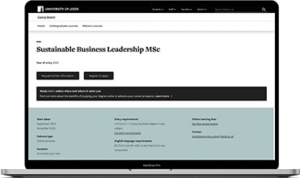How and Why Sustainability is Becoming an Important Issue for Organisations

The importance of sustainability to organisations is growing like never before, with legislative changes such as The Environment Bill, political policies such as G7 pledges and increasing consumer demand dramatically shifting sustainability in business from a nice-to-have to a critical business consideration.
According to Harvard Business Review, sustainability is the process of doing business without negatively impacting the environment, community, or society, to make a positive difference to customers, stakeholders, and ultimately wider business practices. Failure to do so can lead to a negative brand reputation, loss of custom and even financial penalties.
In this blog, we assess several topical sustainability issues that are growing in importance and delve into how they are impacting current business activities, and shaping the future direction of organisations, and the sustainability narratives they are adopting.
1. Climate change
Environmental issues in sustainability are based around the impact on and protection of the environment, addressing concerns such as pollution and waste management. One of the most notable environmental pressures currently impacting both local and global organisations is climate change, which the IPCC (Intergovernmental Panel on Climate Change) define as a damaging change of the global atmosphere attributed to human activity that alters the natural climate over time.
A 2021 report from the United Nations reported a record level of greenhouse gases, linking to rising temperatures and extreme weather conditions which can have a knock-on effect to economies, societies, and businesses. One example includes flooding which can lead to stock or equipment damage and the ability for employees to get into work. These fluctuating weather conditions are also very damaging for organisations operating in a variety of sectors including infrastructure, transport and engineering whose business practices rely heavily on the outdoor environment.
To tackle climate change, organisations are under increasing pressure to adjust key elements of their business operations accordingly. Whilst many large corporations are being criticised for not having set targets or creating weak climate goals, some businesses such as HP have committed to eliminating 75% of its single-use plastic packaging, whilst Unilever have pledged to become carbon-neutral by 2030. Alongside this, other organisations are investing in green innovation and modern technologies such as renewable energy sources in office spaces.
Encouragingly, an increasing number of countries are committing to net-zero emission goals by 2050. Organisations need to keep on top of these trends, and where possible, stay ahead of the curve, as these goals will eventually be fed into business policies such as Nationally Determined Contributions (NDCs) designed to tackle climate change and global warming.

2. Sustainability groups
Social issues typically revolve around a business’s responsibility to individuals such as employees, customers, communities, and other stakeholders.
In the current landscape, sustainability groups including Earth5R and Friends of the Earth who operate as NGO’s dedicated to protecting the natural world, are some of the most influential stakeholders in holding businesses accountable to drive sustainable business change.
Recently, sustainability groups such as Greenpeace have influenced the UK government to ban new petrol and diesel cars being manufactured post-2030 which is not only shaping the automotive industry, but for all organisations this will increase the need to invest in electric vehicles.
Meanwhile, sustainability groups have also encouraged BP to reduce oil and gas production, and increase investment in renewable energy by 2030. As other corporations are under pressure from sustainability groups to follow suit, this is causing a drastic rethink to businesses everyday approaches in using energy and technology.
Meanwhile, the reputation and public trust in sustainability groups continue to develop, making it important for businesses to adjust their sustainable practices to the concerns of these organisations accordingly which will help them enhance their corporate brand image and build relationships with communities. By working with sustainability groups, organisations will also have access to sustainability experts and can take advantage of their knowledge to improve in a socially responsible manner.

3. Sustainable finance support
According to the European Commission, sustainable finance refers to investment decisions that recognise the environmental, social, and governance (ESG) factors of a project. This gives organisations the ability to reduce their environmental impact whilst managing their funds efficiently.
Currently, there is a growing interest in sustainability initiatives, but the execution and roll out typically comes at a price unrealistic for organisations to achieve, particularly for small businesses, with associated costs including investments in planning, training, and hiring to name a few.
To overcome this, companies in the financial sector such as HSBC are agreeing to lend, invest and provide insurance to organisations to help them operate sustainably, from funding support in research and development and sustainable labour practices. As such, organisations are increasingly accessing sustainable finance support, which opens doors for them financially and grants them the unique possibility to integrate sustainability into their business models.

A growing demand for sustainability knowledge and skills
As the demand for business sustainability increases due to environmental, social, and governance factors, the demand for employees with specialist expertise in the area also grows. Global Citizen highlight increased demand for roles such as green designers and construction workers, renewable engineers and technicians, and environmental scientists. Meanwhile, the United Nations predict 24 million new jobs across sustainability to be created globally by 2030.
If you want to deliver sustainable solutions in your company and make a meaningful contribution to sustainability in the workplace, then consider studying our online Sustainable Business Leadership Masters / Postgraduate Certificate where you’ll be exposed to highly contemporary issues at the cutting-edge of research. Our Sustainability and Business module provides a conceptual foundation for tackling the challenges of business sustainability, making significant use of stakeholder’s experiences, and exploring these cases to critically reflect on the business contributions of sustainability.

Did you enjoy this blog? Here's some related sustainability content that you may be interested in:
Want to learn more about our online Sustainable Business Leadership course?

Check out the course content and how to apply

